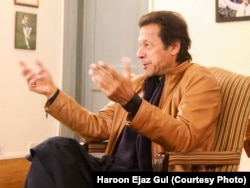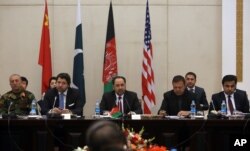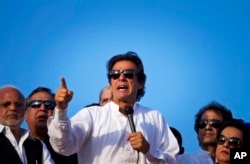Pakistan’s former cricket star-turned-politician, Imran Khan, is urging Afghanistan’s Taliban to negotiate a peaceful resolution to its conflict with the Kabul government.
“They (the Taliban) must come to the table and they must resolve this dispute through talks and negotiations. War is never a solution. In fact, war leads to unintended consequences just like in Iraq and Syria,” Khan said.
“Now you see the emergence of ISIS or Daesh (the Arabic acronym for Islamic State), and God knows where this is going to go. This is a direct result of that insane U.S. invasion of Iraq," he said, using an acronym for the Islamic State group.
Opposition party
The opposition Pakistani politician, who heads a major political force in the national parliament, spoke to VOA in an exclusive interview at his residence in Banigala, just outside Islamabad.
He agreed to the interview to discuss the fallout in Pakistan from continuing instability in Afghanistan, particularly in the province of Khyber Pakhtunkhwa, where Khan’s Pakistan Terik-e-Insaf (PTI) political party is in power.
The former cricket legend, who won the 1992 World Cup for Pakistan, is also popular among sports-loving Afghans and with pro-Taliban groups on both sides of the border for vehemently opposing the U.S.-led military invasion of Afghanistan and U.S. drone strikes against suspected militant hideouts in the Pakistani tribal region.
Khan said some representatives of the Afghan Taliban a few years ago had approached him for assistance because they wanted to open peace negotiations with the then Afghan government.
But he said he believes the U.S. persistently relied on military power to defeat the insurgency, effectively discouraging the Taliban from seeking political reconciliation.
“Now, when they (Taliban) think the Americans are leaving they are now obviously pushing for a much harder bargain. They are not willing to accept the terms they would have accepted then,” Khan said.
Taliban control
Last week, the U.S. Special Inspector General for Afghanistan Reconstruction (SIGAR), reported that the Taliban now controls more territory than at any time since 2001, while approximately 72 percent of the country’s districts are under Afghan government control or influence.
Khan praised a recently launched four-nation peace process, involving Afghanistan, Pakistan, China and the United States, trying resurrect direct peace talks between the Taliban and the Afghan government.
“I think it is a very positive thing. We hope and we pray that there is some sort of peace deal, some sort of a power sharing agreement and then the Americans leave," he said.
The four-way contact group held two meetings last month in Islamabad and Kabul respectively while the next meeting is due in the Pakistani capital on Saturday.
The Taliban, however, has not yet formally indicated whether it supports the peace process or intends to engage in peace talks with Kabul.
Khan emphasized the need for both Pakistan and Afghanistan to remove tensions in bilateral ties and build mutual trust to jointly tackle the security challenges facing them.
“I am very sad that the relationship is not good and I am also sad to say that Pakistan is to blame. We did not have consistent policies dealing with Afghanistan and then the interference in the past in affairs of Afghans has caused a lot of bad blood,” he said.
Bilateral ties
The Pakistani politician, however, sounded optimistic about improvement in bilateral ties.
“I think in future I see very good relationship between the two countries. I think there is a realization in Pakistan that the mistakes were made. We feel that we have to correct this bad blood caused by flawed policies,” Khan said.
He also acknowledged that Afghan refugees residing in Khyber Pakhtunkhwa have lately come under severe pressure from the provincial police, and in some cases refugee families have been forced to go back to Afghanistan against their will.
Khan asserted links between anti-Pakistan militants based on the Afghan side of the border and some of recent deadly terrorist attacks in the province have caused resentment in the local population against Afghan refugees and prompted increased police security actions in the community.
He insisted the PTI provincial government has taken significant steps to control the fallout on Afghan refugees but Khan said he is strongly opposed to their forced repatriation.
“Because clearly there is a reason why they are staying (in Pakistan), things still have not settled in Afghanistan and I will add my voice to all those who are against forced repatriation of the Afghan refugees.”
Most of the nearly 1.7-million registered Afghan refugees are currently located in Khyber Pakhtunkhwa while there are also tens of thousands of illegal economic migrants from Afghanistan.
Political hierarchy
Khan occupies a significant place in Pakistan’s political hierarchy and he has quickly led his relatively young PTI party to prominence.
The national elections in 2013 propelled Khan from a fringe player to the head of the third largest legislative force. He led mass protests in late 2014 to demand Prime Minister Nawaz Sharif step down, accusing him of rigging the election, charges Sharif’s party denies.
A charismatic figure, with a huge following even in Afghanistan, Khan drew continuous applause from Afghan delegates at a Pakistan-Afghanistan Track Two meeting in Islamabad last December, when he urged the Taliban to shun violence and participate in elections.
Two years ago, Khan had also favored a dialogue with the Pakistani militants waging a bloody insurgency against the state, following which political opponents started calling him "Taliban Khan."
However, he has said he is strongly against Taliban violence and supports the military crackdown against them, which he acknowledges has significantly reduced terrorism, particularly in Khyber Pakhtunkhwa.









